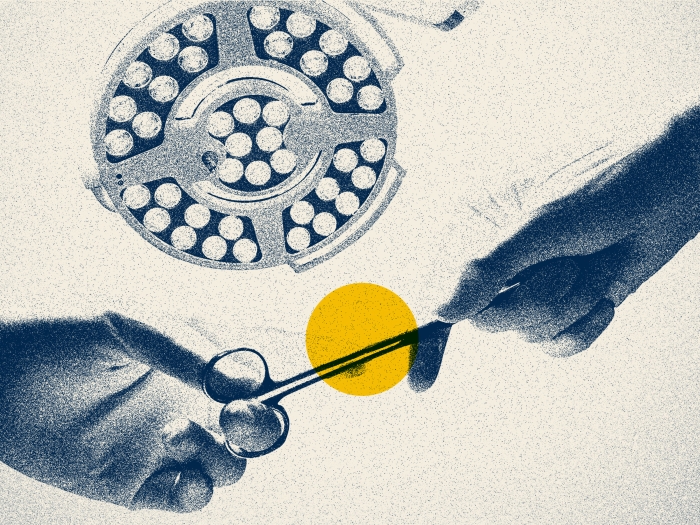Study findings represented the experiences of 1,004 patients from rural clinics in Arkansas, Michigan and Washington.
5:00 AM
Author |
John Nolan served in the United States. Army and Marines and later worked in law enforcement and as a correctional officer. A career spent dealing with traumatic events led to post-traumatic stress disorder and insomnia. He felt like his life was spinning out of control.
Nolan was greatly helped by telepsychiatry services in his town, 125 miles from Little Rock, Ark. He was invited to chair the community advisory board for the largest trial of telepsychiatry to date.
Like Podcasts? Add the Michigan Medicine News Break on iTunes or anywhere you listen to podcasts.
The five-year study, published JAMA Psychiatry, found that telepsychiatry in rural, federally qualified health centers was a resounding success for patients who had screened positive for bipolar disorder and/or post traumatic stress disorder, commonly known as PTSD.
The trial, called The Study to Promote Innovation in Rural Integrated Telepsychiatry, or SPIRIT, was designed to identify the best approach to delivering tele-mental health services to rural primary-care clinics.
"The results of our trial showed that if you give access to high-quality care for patients who are underserved, they improve their quality of life," said lead researcher John Fortney, Ph.D., a professor of psychiatry and behavioral sciences at the University of Washington School of Medicine.
SEE ALSO: COVID Forced Psychiatric Care Online, and Many Patients Want It to Stay There, Study Finds
"One of the major contributions of this study is what we knew to be effective for depression and anxiety we now know also achieves good outcomes for patients with PTSD and bipolar disorder," said Paul Pfeiffer, M.D., M.S., associate professor of psychiatry at the University of Michigan Medical School and member of the U-M Institute for Healthcare Policy and Innovation. Pfeiffer led the Michigan-based study activities.
The 1,004 participants were enrolled from 24 federally qualified health centers in Washington, Arkansas and Michigan.
Without telepsychiatry, most of these patients would likely not receive help from a mental health specialist for these complex psychiatric disorders, the researchers said.
In fact, only one-third of individuals with bipolar disorder and PTSD receive specialty mental health care in a year, the researchers wrote. They said in primary care settings, only 10% of patients with these disorders receive adequate care.
Nolan had originally enrolled in the study that led to this trial called Telemedicine for Outreach for PTSD at the Department of Veterans Affairs in Little Rock, also overseen by Fortney.
"It made a huge difference in my life," he said.
As the SPIRIT trial wound down, Nolan said he could hear the hope and relief in the voices of participants who shared their stories in a video documentary.
SPIRIT trial
The trial compared two interactive video approaches to integrate remote specialty mental health services in participating clinics. Tele-referral services involved one-on-one visits with a psychiatrist or licensed clinical psychologist. Tele-collaborative services involved a telepsychiatrist and care manager supporting visits with a primary care provider. This collaborative model, pioneered at the U-W School of Medicine, allows a psychiatrist to manage more patients than the traditional referral model.
After patients completed the baseline survey, they were randomized to either get tele-referral care or tele-collaborative care.
The clinics partnered with the state medical schools to provide the telepsychiatry and telepsychology services. While many federally qualified health centers provide mental health care, only about 10% of staff are psychiatrists or licensed clinical psychologists, Fortney said.
SEE ALSO: What does the future hold for telehealth? New report gives hints
By providing care from the states' medical schools, they minimized patients' travel burdens. And the potential stigma of a mental health care visit was averted by having the medical school providers credentialed to practice at the health center, giving the appearance of a regular healthcare visit.
Results of the trial
Patients in both groups reported substantially and statistically significant improvements in perceived access to care, decreases in their mental health symptoms and medication side effects, and improvements in their quality of life. There was no difference between the groups, and there were no differences in outcomes regarding age, gender, race or ethnicity.
The trial results come as the COVID-19 pandemic has enabled providers and patients alike to experience virtual care and to see the benefits for themselves, paving the way for wider adoption of telepsychiatry.
Jürgen Unützer, M.D., M.P.H., M.A., chair of the Department of Psychiatry and Behavioral Sciences at the University of Washington School of Medicine, said both the timing and impact of this trial are really important.
MORE FROM THE LAB: Subscribe to our weekly newsletter
"We're at a time now where almost everybody has sort of come to realize what a huge burden untreated mental illness and addiction problems have been," he said.
While there is still a critical workforce shortage of psychiatrists, psychologists, clinical social workers and counselors, Unützer said, this trial shows how to distribute the available workforce a little bit more effectively.
This trial was funded by the Patient-Centered Outcomes Research Institute.
Paper cited: "Comparison of Teleintegrated Care and Telereferral Care for Treating Complex Psychiatric Disorders in Primary Care," JAMA Psychiatry. DOI: 10.1001/jamapsychiatry.2021.2318

Explore a variety of healthcare news & stories by visiting the Health Lab home page for more articles.

Department of Communication at Michigan Medicine
Want top health & research news weekly? Sign up for Health Lab’s newsletters today!





